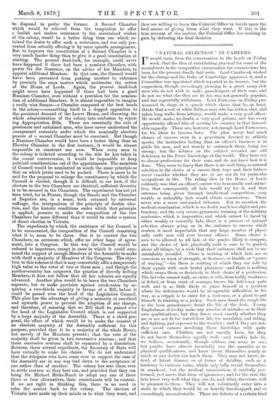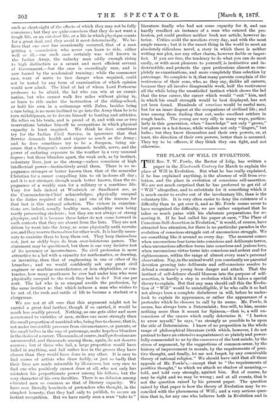"NATURAL SELECTION" IN CAREERS.
IT would seem, from the conversation in the Lords on Friday week, that the idea of substituting physical for some of the mental tests in the competitive examination for commissions has been, for the present, finally laid aside. Lord Cranbrook wished for the change and the Duke of Cambridge approved it, and a Committee was appointed which reported in its favour; but the suggestion, though exceedingly pleasing to a great many rich men who do not wish to make gamekeepers of their sons, and do not see what else they are fit for, was not generally popular, and was regretfully withdrawn. Lord Fortescue on Friday pro- nounced its elegy, in a speech which shows that he, at least, thinks that a sort of white Zulu, a man who has ridden, shot, and token long walks from infancy, would make a very good officer. He would make, no doubt, a very good private, and has every opportunity offered him of serving his country in that honour- able capacity. There are, however, not enough Lord Fortescues, for his ideas to become laws. The plan never had much chance of success even in a generation devoted to athletic sports, the instinctive feeling that an officer's business is to guide his men, and not merely to outmarch them, being too strong ; but the debates on the subject revealed one odd deficiency in the Peers' knowledge of the world. They have not to choose professions for their sous, and do not know how it is done. They seem to fancy that there is no such thing as natural selection in the choice of a career, that boys and their fathers never consider whether they are or are not fit for particular occupations in life. The ruling idea in the House of Lords evidently was that an officer's career was honourable and attrac- tive, that consequently all lads would try for it, and that entrance being given through intellectual competition, very weakly or unhealthy lads would obtain commissions. There never was a more unfounded delusion. Not to mention the medical examination, which is no doubt much too slight and per- functory, and the very severe gymnastic training of the military academies, which is imperative, and which cannot be faced by either weakly or cowardly lads, there is a process of natural selection always going on in the entrance to careers which renders it most improbable that any large number of physi- cally unfit men will ever become officers. Some choice is sure to be allowed to all lads of the grades likely to compete, and the choice of lads physically unfit is sure to be guided, above all things, by a wish that their unfitness shall not be un- mistakably revealed. There is nothing of which lads are so conscious as want of strength, or fleetness, or health, or "power of staying,"—for there is nothing of which they are told by their equals with such brutal plainness—and there is nothing which sways them so decisively in their choice of a profession. The lad who cannot walk, or swim, or ride, from bodily weakness, or defect, or from want of courage, knows his deficiency quite well, and is as little likely to place himself in a position where his deficiencies would be insuperable difficulties in his way, as a cripple is to enter for a foot-race, or a giant to put himself in training as a jockey. Such men dread the rough life as the born gamekeepers dread the life of the desk. Young Englishmen of to-day make any number of mistakes as to their own qualifications, but they know most exactly whether they are or are not fit for out-of-door life, for marching, and riding, and fighting, and exposure to the weather ; and if they are not, they avoid careers involving those hardships with quite sufficient care. Children are not equally keen, for they do not know themselves equally well,--and weakly lads do, we believe, occasionally, though seldom, run away to sea ; but youths have almost invariably run the gauntlet as to
physical qualifications, and know about themselves nearly as much as any doctor can teach them. They may not know, in- deed, of latent disease, or of forms of debility, such as a tendency to varicose veins, which only fully reveal themselves in manhood, but the medical examination, if carefully per- formed, just meets that form of ignorance ; and for the rest, the lads know very well what they can do, and what, therefore, will be pleasant to them. They will not voluntarily enter into a strife in which they would be so heavily handicapped, and so exceedingly uncomfortable. There are defects of a certain kind. such as short-sight of the effects of which they may not be fully conscious ; but they are quite conscious that they do not want a rough life, or an out-door life, or a life in which physique counts for a great deal, and they avoid it most determinedly. We be- lieve that one case has occasionally occurred, that of a man getting a commission who never can learn to ride, either well or ill,—one such case certainly was well known in the Indian Army, the unlucky man oddly enough rising to high distinction as a savant and most efficient servant of Government,—but the case is exceedingly rare, and is now barred by the academical training ; while the commoner case, want of nerve to face danger when required, could not be tested by any form of examination of which opinion would now admit. The kind of lad of whom Lord Fortescue professes to be afraid, the lad who can win at an exami- nation, but who cannot walk five miles without giving in, or learn to ride under the instruction of the riding-school, or hold his own in a scrimmage with Zulus, besides being a rare being, is no more inclined to go into the Army than he is to turn midshipman, or to devote himself to boating and athletics. He relies on his brain, and is proud. of it, and with one or two reservations betakes himself to occupations in which physical capacity is least required. We think he does sometimes try for the Indian Civil Service, in ignorance that that Service demands health and vigour as much as the Army ; and he does sometimes try to be a Surgeon, being un- aware that a Surgeon's career demands health, nerve, and the power of enduring exposure to the weather in a very unusual degree ; but those blunders apart, the weak seek, as by instinct, sedentary lives, just as the strong—unless conscious of high intellectual power—instinctively avoid them. There is no re- pugnance stronger or better known than that of the muscular Christian for a career compelling him to sit in-doors all day ; and it is not stronger, though much better known, than the re- pugnance of a weakly man for a military or a maritime life. Very few lads indeed at Woolwich or Sandhurst are, as the Commander-in-Chief acknowledges, physically unequal to the duties required of them ; and one of the reasons for that fact is this natural selection. The victors in examina- tions are, indeed, usually healthy men, unhealthy men being rarely persevering students ; but they are not always of strong physique, and it is because these latter do not come forward in such contests that they are absent from the lists. They are not driven by want into the Army, as some physically unfit recruits are, and they reserve themselves for other work. It is hardly neces- sary to examine them to keep them out. They keep themselves out, just as sickly boys do from over-boisterous games. The statement may be questioned, but there is one very decisive test of its accuracy or incorrectness. No civil profession is more attractive to a lad with a capacity for mathematics, or drawing, or inventing, than that of engineering in one or other of its branches ; and we would confidently ask any great civil engineer or machine manufacturer, or iron shipbuilder, or con- tractor, how many gentlemen he ever had under him who were physically unequal to the work they had to do P Not one per cent. The lad who is so unequal avoids the profession, by the same instinct as that which induces a man who wishes to be out of. the rush and rattle of life to become a student or a clergyman.
We are not at all sure that this argument might not be carried a great deal farther, though if so carried, it would be much less readily proved. Nothing, as one gets older and more accustomed to varieties of men, strikes one more strongly than the small proportion of mankind who, being free to choose, that is, not under irresistible pressure from circumstances, or parents, or the small bribes in the way of patronage, make hopeless blunders in the choice of a career. Thousands, of course, in all professions are unsuccessful, and thousands among them, again, do not deserve success ; but of those who fail, a large proportion would have failed in anything, and fail rather less in the groove they have chosen than they would have done in any other. It is easy to find scores of artists who draw feebly, or just so badly that their lives are made miserable by ill-success, but very rare to find one who positively cannot draw at all, who not only has mistaken his proportionate power among his fellows, but the very character of his own faculties. There is no delusion among educated men so common as that of literary capacity. We have seen literally hundreds of pretenders who thought, in the simplest honesty, that they had only to publish, to secure an instant recognition. But we have rarely seen a man "take to" literature finally who had not some capacity for it, and can hardly recollect an instance of a man who entered the pro- fession, yet could produce neither book nor article, however in- ferior. Critics scold the novelists every day, and with the most ample reason ; but it is the rarest thing in the world to meet an absolutely ridiculous novel, a story in which there is neither writing nor plot, nor any other charm, however feeble or imper- fect. If you are free, the tendency to do what you can do most easily, or with most pleasure to yourself, is instinctive and in- destructible, and protects the open professions almost as com- pletely as examinations, and more completely than selection by patronage. So complete is it, that many parents complain of the restiveness of their sons, who, as they say, dislike all careers, because they all involve disagreeable work, half the restiveness all the while being the unsatisfied instinct which shows the lad that the true career, the career which would " suit " him, and in which his small strength would be best displayed, has not yet been found. Hundreds of vauriens would be useful men, but for an inner disgust at the occupations of civilised life ; and tens among them finding that out, make excellent settlers in rough lands. The young are very silly in many ways, particu- larly in this generation, when " knowledge " not only "grows," but grows in a hot-house, while wisdom not only "lingers," but halts ; but they know themselves and their own powers, or, at least, the direction of their own powers, better than is assumed. They try to be officers, if they think they can fight, and not otherwise.



































 Previous page
Previous page